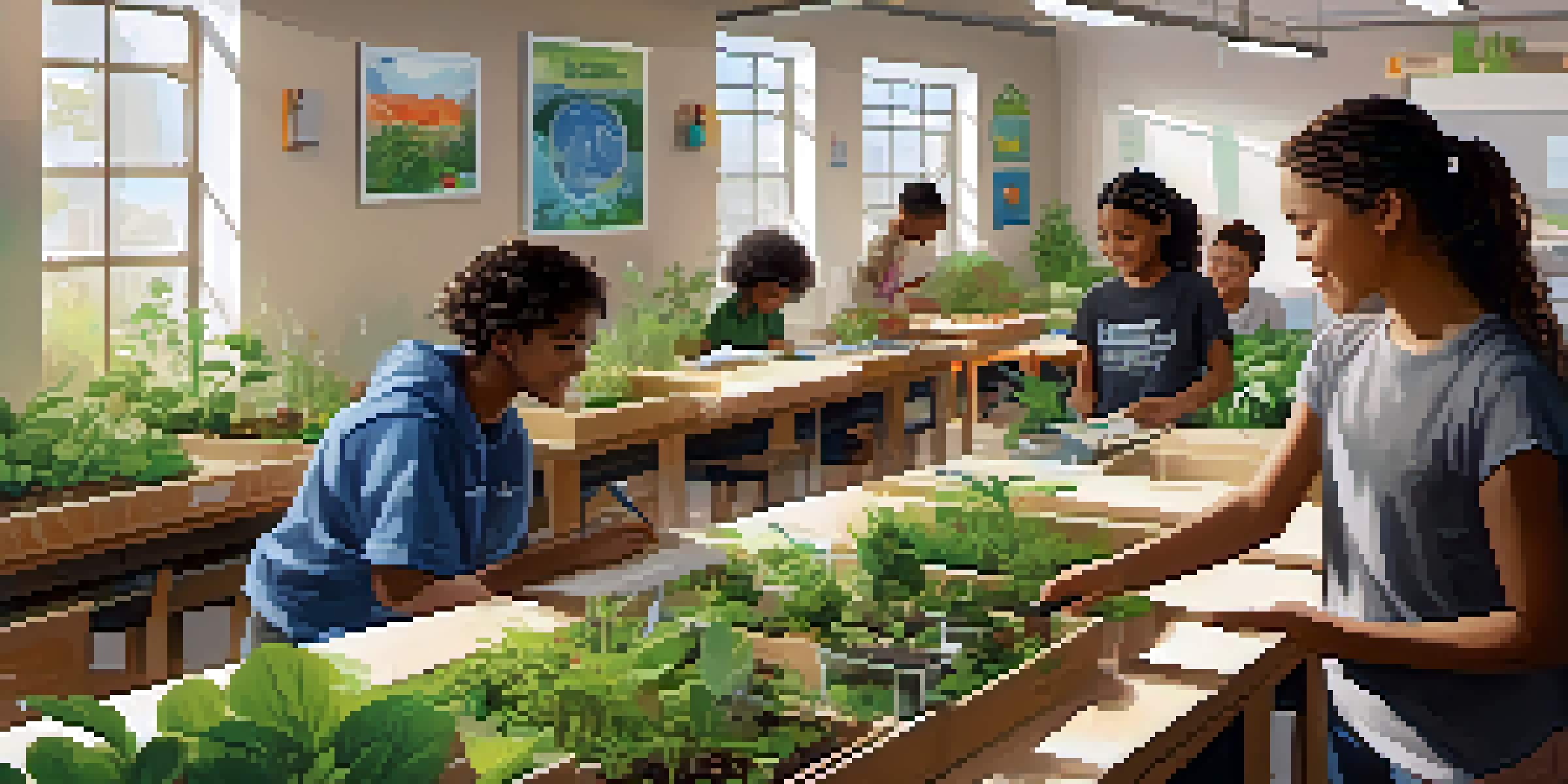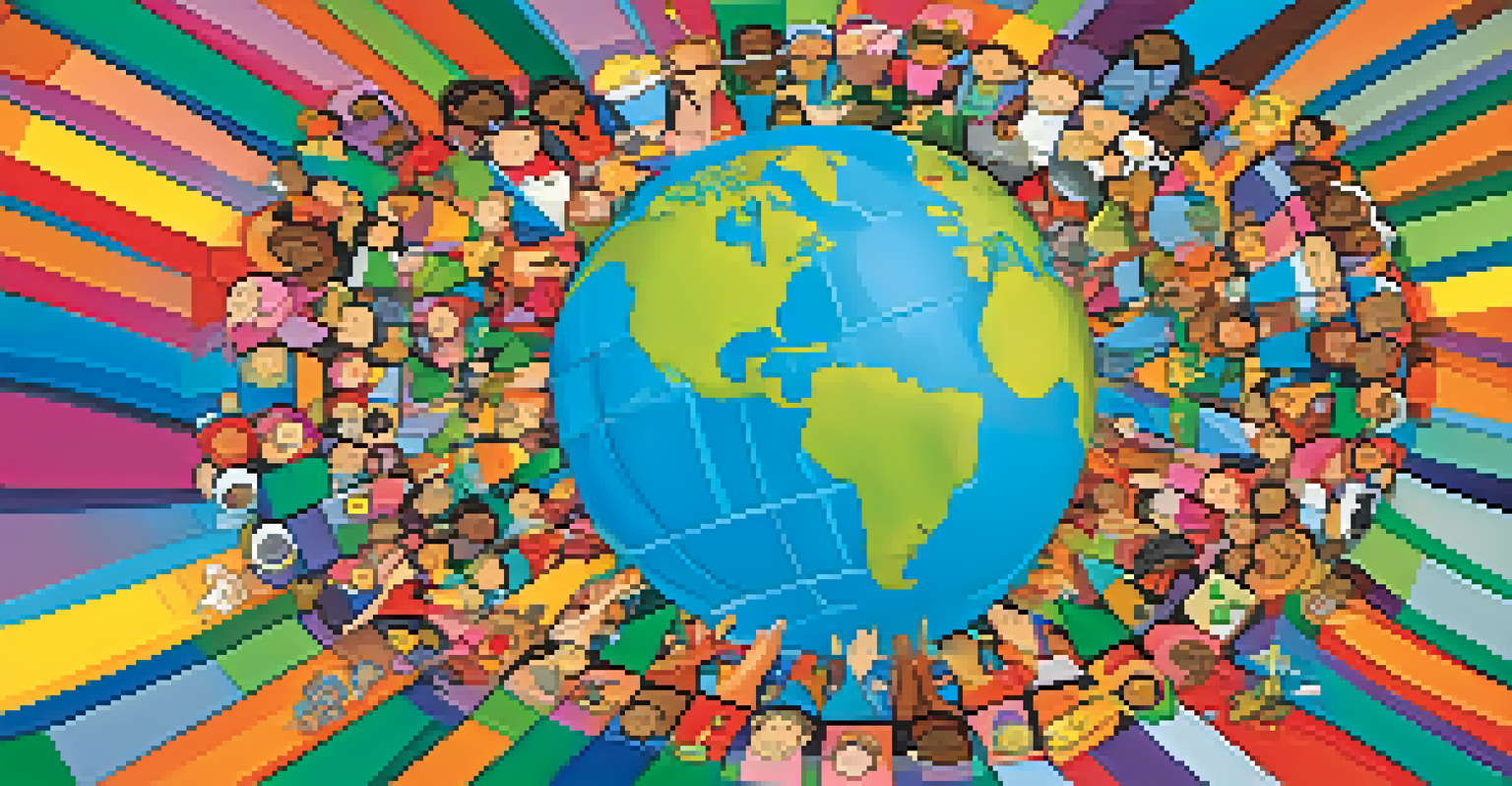Sustainable Development Goals and Education's Role

Understanding the Sustainable Development Goals (SDGs)
The Sustainable Development Goals, or SDGs, are a universal call to action initiated by the United Nations in 2015. They consist of 17 interconnected goals aimed at addressing global challenges such as poverty, inequality, and climate change. Each goal is designed to be achieved by 2030, creating a roadmap for a more sustainable future for all.
Education is the most powerful weapon which you can use to change the world.
Think of the SDGs as a toolkit—each goal is like a tool that helps us tackle specific issues that impact humanity and the planet. For instance, Goal 1 focuses on eradicating poverty, while Goal 13 emphasizes climate action. Together, they form a comprehensive strategy to create a balanced and just world.
Education plays a pivotal role in achieving these goals by equipping individuals with the knowledge and skills needed to drive change. By understanding the SDGs, we can better appreciate the importance of education in fostering sustainable development.
The Link Between Education and SDG 4
SDG 4 aims to ensure inclusive and equitable quality education and promote lifelong learning opportunities for all. Education is not just about formal schooling; it encompasses vocational training, adult education, and informal learning as well. When we think about education in this broader context, its importance becomes even more evident.

Quality education can empower individuals to break cycles of poverty and inequality, allowing them to contribute positively to their communities. For example, a well-educated workforce is essential for economic growth and innovation, which are critical for achieving many other SDGs.
Education Drives Sustainable Development
Education empowers individuals to tackle global challenges, making it essential for achieving the Sustainable Development Goals.
Moreover, education fosters critical thinking and problem-solving skills, enabling individuals to address complex challenges such as climate change and social injustice. As we enhance educational opportunities, we pave the way for a more sustainable and equitable world.
Education's Role in Promoting Gender Equality (SDG 5)
One of the most significant impacts of education is its ability to promote gender equality, as highlighted in SDG 5. When girls receive an education, they are more likely to make informed choices about their lives, health, and future. This leads to a ripple effect that benefits families and communities as a whole.
Sustainability is not a destination, but a journey of continuous improvement.
Educated women are more likely to participate in the workforce, contribute to their local economies, and advocate for their rights. For instance, studies have shown that when women are educated, they tend to have smaller, healthier families, which can reduce poverty levels in their communities.
By prioritizing education for all genders, we not only empower individuals but also lay the groundwork for a more just and equitable society. This is a crucial step in achieving the SDGs and creating lasting change.
Fostering Sustainable Practices Through Education (SDG 12)
SDG 12 focuses on ensuring sustainable consumption and production patterns, which is increasingly important in our resource-constrained world. Education can play a vital role in teaching individuals about sustainable practices, such as reducing waste and conserving resources. The more people know about these issues, the more likely they are to take action.
For example, schools can incorporate sustainability into their curricula by teaching students about recycling, conservation, and the importance of biodiversity. This hands-on approach can inspire the next generation to adopt environmentally-friendly habits and advocate for sustainability in their communities.
Gender Equality Through Education
Educating girls leads to informed choices and healthier families, ultimately benefiting communities and promoting gender equality.
Ultimately, education can equip individuals with the tools they need to make informed choices that benefit both themselves and the planet. By integrating sustainability into educational programs, we can help create a culture of responsibility and care for our environment.
The Importance of Global Citizenship Education (SDG 16)
Education is critical for fostering global citizenship, which aligns with SDG 16's focus on promoting peaceful and inclusive societies. Global citizenship education encourages individuals to understand their role in the world and promotes values such as empathy, respect, and social justice. This education helps cultivate a sense of belonging and responsibility towards others, regardless of national boundaries.
For instance, when students engage in projects that address global issues like poverty or climate change, they develop a deeper understanding of the interconnectedness of our world. This awareness can motivate them to become advocates for peace and social change in their communities.
By promoting global citizenship through education, we can create a generation that values inclusivity and works towards a more just and peaceful world. This is essential for achieving the SDGs and addressing the challenges we face as a global community.
Innovative Approaches to Education for Sustainable Development
As we strive to meet the SDGs, innovative approaches to education are becoming increasingly important. Integrating technology, experiential learning, and interdisciplinary teaching can enhance educational experiences and make learning more relevant to real-world challenges. For instance, project-based learning allows students to engage with sustainability issues directly.
Additionally, online platforms and digital resources can expand access to quality education, especially in underserved communities. These tools can help bridge the gap in educational opportunities and ensure that everyone has the chance to learn about sustainability and its importance.
Innovative Learning for Future Action
Embracing innovative educational approaches fosters creativity and critical thinking, equipping students to address pressing sustainability challenges.
By embracing innovative teaching methods, we can inspire creativity and critical thinking in students, equipping them to address the pressing challenges of our time. This adaptability is crucial for fostering a culture of sustainability and supporting the SDGs.
The Role of Educators in Advancing the SDGs
Educators play a crucial role in advancing the Sustainable Development Goals through their influence on students. They are not just teachers; they are mentors and guides who can inspire the next generation to take action on global issues. By incorporating the SDGs into their curricula, educators can help students understand the importance of these goals and motivate them to get involved.
Moreover, educators can model sustainable practices in their classrooms, demonstrating the values of conservation and social responsibility. This can include everything from reducing waste in the school environment to encouraging community service projects that promote social change.

By empowering educators to be advocates for the SDGs, we can create a network of change-makers who inspire students to make a difference in their communities. Together, we can build a brighter, more sustainable future.